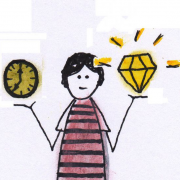K.exchange – ein systematischer Ansatz für den Wissenstransfer bei Fach- und Führungskräftewechseln
Gerade entdeckt und gleich geteilt: Die spannende und inspirierende Darstellung eines Wissenstransfer-Konzeptes mit Fokus auf das Thema „Erfahrungs- und Netzwerkwissen weitergeben“ und dem Titel K.exchange – A Systematic Approach to Knowledge Transfer of the Aging Workforce der Pumacy Technologies AG in Berlin aus dem Jahr 2008.
Das dort sehr anschaulich und detailliert beschriebene „K.Exchange“-Konzept ist unserem „KT-Framework“ (siehe unten) inhaltlich und von den Grundideen in vielen Punkten sehr ähnlich – was mich sehr freut und natürlich auch in meiner Herangehensweise bestätigt.
Was mir an „K.exchange“ besonders gut gefällt:
- Die Verzahnung von Prozess, Methoden und organisationalen Maßnahmen, wie z.B die Definition neuer Rollen und Verantwortlichkeiten … und damit im Zusammenhang…
- die herausgestellte Bedeutung der Rolle der „process coordinators“ (vergleichbar mit dem „KT Champion“ in unserem Ansatz):
… the process coordinator […] plays a central role as the main facilitator of the transfer process. The process coordinator has various responsibilities, e.g., to ensure the correct implementation of all process steps, to summon the kick-off meeting, to perform the analysis, to prepare the action plan, to ensure that the actions are finished and to facilitate specific transfer actions.“
- Der Fokus auf persönliche „face-to-face“ Transfergelegenheiten in Kombination mit involvierenden sowie narrativen Transfermethoden:
Above all, the transfer of experience-based knowledge is more likely to be successful when the moving expert and his successor get to know each other and interchange knowledge face-to-face.
The interaction with the knowledge provider allows the knowledge receiver to understand the context in which the experience was gained, and thus, classifies the experience and attribute meaning to it.
Das im Mittelteil äußerst anschaulich in Erzählform beschriebene Fallbeispiel vermittelt ein gutes Bild von der Anwendung des Konzeptes. Besonders spannend dabei der Stimmungs-Umschwung in der Analysephase: Das Potential eines neutralen, der Sache „verhafteten“ Moderators wird hier noch einmal mehr als deutlich; ohne sein offenes Ohr, sein Gespür und seine Vermittlung wäre das Transfer-Projekt höchst wahrscheinlich von Anfang an zum Scheitern verurteilt gewesen:
„What started as a demotivating situation for the knowledge provider could be changed into a stimulating work environment? The facilitator/process moderator could bring about a rebound by slightly changing the work content and uncovering hidden inspirations. This means that new challenges were discovered and allocated to the job which sparked the job holder’s interest in transferring his expertise and, at the same time, motivated his personal involvementand efforts again.“
Das Papier präsentiert am Ende vier Erfolgsfaktoren, die sich auch in unserem Projekten stets identisch herauskristallisieren (siehe unten):
Thanks to the system’s inherent flexibility, the process can be adapted to the individual situation to enable a successful knowledge transfer. Other main factors for a successful knowledge exchange are:
- consistent consideration of the individual needs of the people involved,
- focus on interaction-oriented knowledge transfer methods, and
- organizational integration by means of the transfer network, a transparent identification process and feedback loops.
.. und schließt mit einem Fazit, dem wir uns nur anschließen können:
The experiences described in this case study can be summarized in a clear recommendation for any organization that intents to embark on a KM initiative:
Before you start any other KM project, implement a knowledge exchange process in your organization – it will provide the fastest return on investment of all KM solutions!


 Kristin Block
Kristin Block 

 Kristin Block
Kristin Block 
 Kristin Block
Kristin Block 


Hinterlasse einen Kommentar
An der Diskussion beteiligen?Hinterlasse uns deinen Kommentar!